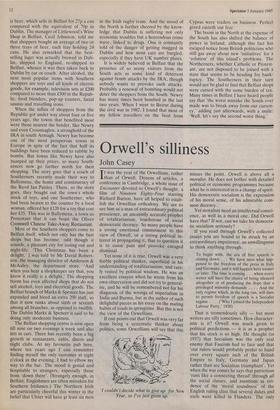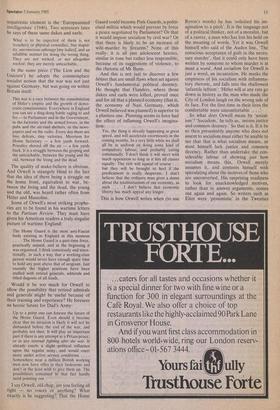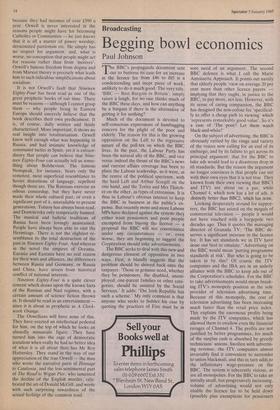Orwell's silliness
John Casey
It was the year of the Orwellians, rather than of Orwell. Dozens of articles, a conference in Cambridge, a whole issue of Encounter devoted to Orwell's thought, a film of Nineteen Eighty-Four starring Richard Burton, have all helped to estab- lish the Orwellian orthodoxy. We are to see him as a man of extraordinary political prescience, an uncannily accurate prophet of totalitarianism, touchstone of social democratic decency. So many people have a strong emotional commitment to this view of Orwell, or a strong political in- terest in propagating it, that to question it is to cause pain and provoke enraged dismissal.
Yet none of it is true. Orwell was a very feeble political thinker, superficial in his understanding of totalitarianism, and rare- ly visited by political wisdom. He was an excellent essayist when he wrote from his own observation and did not try to general- ise, and he will be remembered not for his diagnosis of the wrongs of imperialism in India and Burma, but as the author of such delightful pieces as his essay on the mating habits of toads in springtime. But this is not the view of the Orwellians.
If one points out that Orwell was very far from being a systematic thinker about politics, some Orwellians will say that this 'I couldn't decide what to give up for New Year, so I've just given up. misses the point. Orwell is above all a moralist. He does not bother with detailed political or economic programmes because what he is interested in is a change of spirit. His democratic socialism is the expression of his moral sense, of his admirable com- mon decency.
Yet moralists need an intellectual consci- ence, as well as a moral one. Did Orwell have that? If not, can we take his democra- tic socialism seriously?
If you read through Orwell's collected essays you are bound to be struck by an extraordinary impatience, an unwillingness to think anything through:
To begin with, the era of free speech is closing down . . . We have seen what hap- pened to the freedom of the press in Italy and Germany, and it will happen here sooner or later. The time is coming. . . when every writer will have the choice of being silenced altogether or of producing the dope that a privileged minority demands . . . . And the only regime which, in the long run, will dare to permit freedom of speech is a Socialist regime . . . ('Why I joined the Independent Labour Party,' 1938)
That is tremendously silly — but most writers are silly sometimes. How character- istic is it? Orwell was much given to political predictions — it is as a prophet that his stock is so high. He thought (in 1937) that Socialism was the only real enemy that Fascism had to face and that 'our rulers would probably prefer to hand over every square inch of the British Empire to Italy, Germany and Japan rather than see Socialism triumphant'. Yet when the war comes he says that patriotism 'runs like a connecting thread' through all the social classes, and mentions as evi- dence of the 'moral soundness' of the English ruling class that several dukes and earls were killed in Flanders. The only
unpatriotic element is the 'Europeanised intelligentsia' (1940). Two sentences later he says of these same dukes and earls:
What is to be expected of them is not treachery or physical cowardice, but stupid- ity, unconscious sabotage Imy italicsi, and an infallible instinct for doing the wrong thing. They are not wicked, or not altogether wicked; they are merely unteachable.
In the same piece (`The Lion and the Unicorn') he adopts the commonplace socialist notion that the war was not just against Germany, but was going on within Britain itself:
This war is a race between the consolidation of Hitler's empire and the growth of demo- cratic consciousness. Everywhere in England you can see a ding-dong battle raging to and fro — in Parliament and in the Government, in the factories and the armed forces, in the pubs and the air-raid shelters, in the news- papers and on the radio. Every day there are tiny defeats, tiny victories. Morrison for Home Secretary — a few yards forward. Priestley shoved off the air — a few yards back. It is a struggle between the groping and the unteachable, between the young and the old, between the living and the dead.
The quality of make-believe is obvious. And Orwell is strangely blind to the fact that the idea of there being a struggle on the home front, equivalent to war, be- tween the living and the dead, the young and the old, was heard rather often from Hitler and Mussolini.
Some of Orwell's most striking prophe- cies are to be found in his wartime letters to the Partisan Review. They must have given his American readers a truly singular picture of wartime England:
The Home Guard is the most anti-Fascist body existing in England at this moment . . . . The Home Guard is a part-time force, practically unpaid, and at the beginning it was organised, I think consciously and inten- tionally, in such a way that a working-class person would never have enough spare time to hold any post above that of sergeant. Just recently the higher positions have been stuffed with retired generals, admirals and titled dugouts of all kinds.
Would it be too much for Orwell to allow the possibility that retired admirals and generals' might be useful because of their training and experience? He foresees an heroic future for Dad's Army:
Up to a point one can foresee the future of the Home Guard. Even should it become clear that no invasion is likely it will not be disbanded before the end of the war, and probably not then. It will play an important part if there is any attempt at a Main peace, or in any internal fighting after the war. It already exerts a slight political influence upon the regular army, and would exert more under active service conditions . . . . Somewhere near a million British working men now have rifles in their bedrooms and don't in the least wish to give them up. The possibilities contained in that fact hardly need pointing out.
I say Orwell, old chap, are you feeling all right — no voices or anything? What exactly is he suggesting? That the Home
Guard could become Pink Guards, a politi- cised militia which would prevent by force a peace negotiated by Parliament? Or that it would impose socialism by civil war? Or that there is likely to be an increase of wife-murder by firearms? None of this really: it is all just adolescent , heroics, similar in tone but rather less responsible, because of its suggestions of violence, to the rhetoric of Mr Benn.
And this is not just to discover a .few betises that are small flaws when set against Orwell's fundamental political decency. He thought that Flanders, where those dukes and earls were killed, proved once and for all that a planned economy (that is, the economy of Nazi Germany, which Orwell believed was planned) is superior to a planless one. Planning seems to have had the effect of inflaming Orwell's imagina- tion:
Yes, the thing is already happening at great speed, and will accelerate enormously in the coming months. In a very little while we shall all be in uniform or doing some kind of compulsory labour, and probably eating communally. I' don't think it will meet with much opposition so long as it hits all classes equally. The rich will squeal of course . . . but they will be brought to heel if the predicament is really desperate. I don't believe that the ordinary man gives a damn about the totalitarianism of our economy, as such . . . . I don't believe that economic liberty has much appeal any longer.
This is how Orwell writes when (to use
Byron's words) he has 'solicited his im- agination to a pitch'. It is the language not of a political thinker, not of a moralist, but of a ranter, a man who has lost his hold on the meaning of words. Yet it was Orwell himself who said of the Auden line, 'The conscious acceptance of guilt in the neces- sary murder', that it could only have been written by someone to whom murder is at most a word. And socialism for Orwell is just a word, an incantation. He masks the emptiness of his socialism with inflamma- tory rhetoric, and falls into the shallowest 'infantile leftism': 'Hitler will at any rate go down in history as the man who made the City of London laugh on the wrong side of its face. For the first time in their lives the comfortable were uncomfortable . .
So what does Orwell mean by 'social- ism'? 'Socialism,' he tells us, 'means justice and common decency.' So that is it. If it be so then presumably anyone who does not assent to socialism must either be unable to see that that is what socialism means, or must himself lack justice and common decency. Rather than undertake the con- siderable labour of showing just how socialism means this, Orwell merely assumes it, and contents himself with speculating about the motives of those who are unconverted. His surprising readiness to look for unacknowledged motives, rather than to answer arguments, comes out again and again. So writers such as Eliot were 'pessimistic' in the Twenties
because they had incomes of over £500 a year. Orwell is never interested in the reasons people might have for becoming Catholics or Communists — he just knows that it is all a matter of power worship, deracinated patriotism etc. He simply has no respect for argument, and, what is worse, no conception that people might act for reasons rather than from 'motives'. Orwell's famous freedom from dogma and from Marxist theory is precisely what leads him to such ridiculous simplifications about socialism.
It is not Orwell's fault that Nineteen Eighty-Four has been read as one of the great prophetic books of our time. There must be reasons — although I cannot grasp them --- why people living in Eastern Europe should sincerely believe that the book describes their own predicament. It is, of course, dully written and thinly characterised. More important, it shows no real insight into totalitarianism. Orwell knew well enough what was happening in Russia, and had intimate knowledge of communist tactics in Spain. yet it is extraor- dinary that people can believe that Nine- teen Eighty-Four can actually tell us some- thing about Bolshevism. The famous Newspeak, for instance, bears only the remotest, most superficial resemblance to Soviet distortions of language, repellent though those are. The Russians exercise an odious censorship, but they have never made their whole cultural past, or even a significant part of it, unavailable to present generations. Tolstoy has always been read, and Dostoievsky only temporarily banned. The musical and balletic traditions of Russia have been lovingly maintained. People have always been able to visit the Hermitage. There is not the slightest re- semblance to the total destruction of the past in Nineteen Eighty-Four. And whereas in the novel the empires of Oceania, Eurasia and Eastasia have no real reason for their wars and alliances, the differences between Russia and Germany, or Russia and China, have arisen from historical conflict of national interests.
Nineteen Eighty-Four is a quite clever conceit which draws upon the known facts of the Russian and Nazi regimes, with a certain amount of science fiction thrown in. It should be read as an entertainment — since it is about as prophetic as A Clock- work Orange.
The Orwellians will have none of this. They have erected an intellectual pedestal for him, on the top of which he looks an absurdly minuscule figure. They have turned him into the sage of democratic socialism when really he had no better idea of what it is all about than has Mr Roy Hattersley. They stand in the way of our appreciation of the true Orwell — the man who wrote the narrative parts of Homage to Catalonia, and the less sentimental part of The Road to Wigan Pier, who lamented the decline of the English murder, cele- brated the art of Donald McGill, and wrote with such surprising inwardness of the sexual feelings of the common toad.








































 Previous page
Previous page